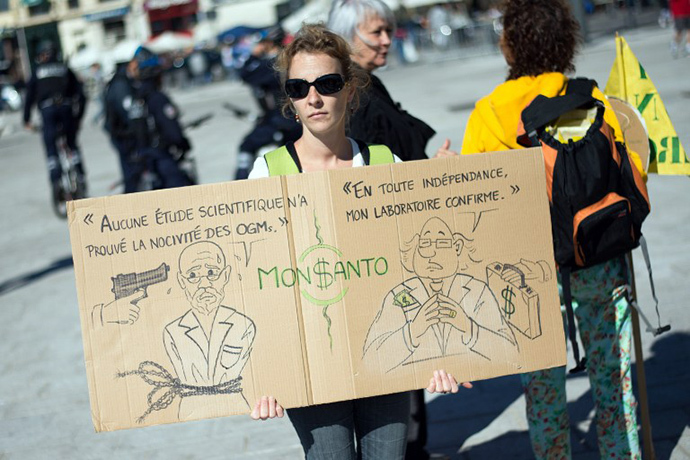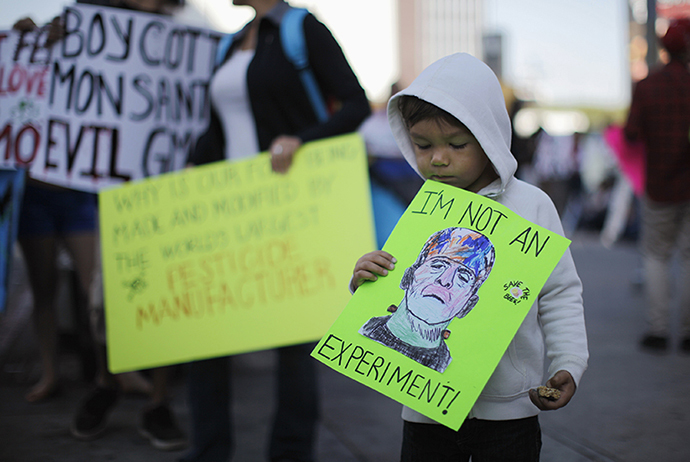People hold signs during one of many worldwide “March Against Monsanto” protests against Genetically Modified Organisms (GMOs) and agro-chemicals, in Los Angeles, California October 12, 2013. (Reuters / Lucy Nicholson)
Thousands took to streets across the world’s cities on Saturday to protest the use of GMO products, with Giant Monsanto being the main target. Over 50 countries have been taking part in the march for world food day, and across 47 different US states.
Berlin, Strasbourg, Chicago, London, Sydney and Mumbai are just a few of the 500 cities worldwide involved in the rallies, with each one drawing hundreds.
The demonstrators have been calling for the permanent boycott of Genetically Modified Organisms (GMOs) and “other harmful agro-chemicals,” according to March Against Monsanto’s official webpage. Protesters wielded large banners denouncing GMO products, and donned fancy dress: In Washington DC a group dressed as bees to highlight the impact of insecticides on bee populations.
 Anti-GMO (genetically modified foods) protestors put a chain at the site entrance of US seed company Monsanto on October 12, 2013 during a day of action against the company, in Monbequi, southern France. Banner (R) reads: “No to a world according to Monsanto”. (AFP Photo / Pascal Pavani)
Anti-GMO (genetically modified foods) protestors put a chain at the site entrance of US seed company Monsanto on October 12, 2013 during a day of action against the company, in Monbequi, southern France. Banner (R) reads: “No to a world according to Monsanto”. (AFP Photo / Pascal Pavani)
Protesters in Washington told RT’s Anissa Naouai that Monsanto lobbyists were hard at work even though the government was shut down. March organizers also said that Saturday’s event was just the beginning, and that the momentum for the protests would build.
The rallies come four days ahead of World Food Day on Oct. 16 and are a direct attack on what the organizers term Monsanto’s “predatory business,” genetically modified organisms (GMOs) and other harmful pesticides, which threaten “health, fertility and longevity.”
 A man holds a painted ear of corn during one of many worldwide “March Against Monsanto” protests against Genetically Modified Organisms (GMOs) and agro-chemicals, in Los Angeles, California October 12, 2013. (Reuters / Lucy Nicholson)
A man holds a painted ear of corn during one of many worldwide “March Against Monsanto” protests against Genetically Modified Organisms (GMOs) and agro-chemicals, in Los Angeles, California October 12, 2013. (Reuters / Lucy Nicholson)
In Berlin, people expressed displeasure at the food giant for a number of reasons, ranging from long-term health concerns to the chemicals used in Monsanto products.
“There a Smartstax corn that Monsanto has made…it is a corn that resists six different types of herbicide, so you can spray it with six different chemicals and it won’t die,” Heidi Ostermannm, a nutritionist participating in the Berlin march told RT.
“It also produces two insecticides in its own kernels and you can’t wash it off – I don’t even know if technically that’s food. In my mind as a nutritionist, that’s no longer food,” she said.
 Anti-genetically modified foods (GMO) protestors demonstrate on October 12, 2013 against US agro-chemicals giant Monsanto in the southern French city of Marseille during a day of worlwide action against the company. (AFP Photo / Bertrand Langlois)
Anti-genetically modified foods (GMO) protestors demonstrate on October 12, 2013 against US agro-chemicals giant Monsanto in the southern French city of Marseille during a day of worlwide action against the company. (AFP Photo / Bertrand Langlois)
Dietrich Wittel, vice president of the True Food Foundation cited experiments conducted on rats, bringing a large poster with him showing the tumors suffered by the animals subject to being fed Monsanto corn.
“There are subtle signs of organ damage even in 90 days. But in two years, the lifetime of a rat is shortened – they have massive organ damage, massive breast tumors in the female rats, and that is really, really frightening,” he said, going on to discuss the effects on larger animals.
“Recently, a study from Australia has shown that pigs that are fed these corn products get massive stomach ulcers…. we have a much longer lifespan that a rat. If we are waiting for cancer to show as a result of GMOs, we’ve got to wait,” he said.
 Demonstrators hold up banners to protest against chemical giant Monsanto and its GMO (genetically modified organism) products on October 12, 2013 in Helsinki. (AFP Photo / Heikki Saukkomaa)
Demonstrators hold up banners to protest against chemical giant Monsanto and its GMO (genetically modified organism) products on October 12, 2013 in Helsinki. (AFP Photo / Heikki Saukkomaa)
October is a particularly significant month for US protesters, as Agent Orange Awareness Month is being promoted by the Children of Vietnam Veterans Health Alliance (COVVHA).
“Monsanto was one of the seven chemical companies who manufactured Agent Orange which was laced with one of the most deadly chemicals known to man, dioxin. Monsanto, the other six companies, and the U.S. government, are responsible for the slow burn genocide of Vietnam Veterans, their children and grandchildren,” March Against Monsanto alleged.
A previous anti-Monsanto protest was held in May. It started as a small event, but turned into a global campaign with over 2 million people in 436 cities, across 52 countries, joining the rallies.
 Jameson Bluma, 3, holds a sign during one of many worldwide “March Against Monsanto” protests against Genetically Modified Organisms (GMOs) and agro-chemicals, in Los Angeles, California October 12, 2013. (Reuters / Lucy Nicholson)
Jameson Bluma, 3, holds a sign during one of many worldwide “March Against Monsanto” protests against Genetically Modified Organisms (GMOs) and agro-chemicals, in Los Angeles, California October 12, 2013. (Reuters / Lucy Nicholson)
Opponents of the development of a type of genetically modified (GM) rice enriched with vitamin A are “wicked”, the environment secretary has said.
In an interview with the Independent, Owen Paterson said they could be condemning millions of people in the developing world to a premature death.
Mr Paterson backed a letter from international scientists calling for the rapid development of “golden rice”.
But campaigners say the benefits claimed for the rice are misleading.
‘Dark shadow’
Mr Paterson told the newspaper: “It’s just disgusting that little children are allowed to go blind and die because of a hang-up by a small number of people about this technology.
“I feel really strongly about it. I think what they do is absolutely wicked. There is no other word for it.”
Mr Paterson did not specify any particular groups in his interview but also said opponents of GM technology were “casting a dark shadow over attempts to feed the world”.
BBC political correspondent Carole Walker said Mr Paterson was known as a strong supporter of GM crops but his language seemed certain to raise hackles with those who took a different view.
A Department for Environment, Food and Rural Affairs (Defra) spokeswoman said it was Mr Paterson’s strong personal view.
‘Cause for outrage’
Meanwhile, in a letter to US journal Science, a group of leading academics accused Western non-governmental organisations (NGOs) of fuelling opposition to the development of GM technologies.
They wrote: “If ever there was a clear-cut cause for outrage, it is the concerted campaign by Greenpeace and other non-governmental organisations, as well as by individuals, against golden rice.”
Environmental campaigners such as Greenpeace and Friends of the Earth have said there are more effective solutions to vitamin A deficiency.
Mr Paterson also used the interview to defend the government’s handling of the badger cull – aimed at preventing the spread of bovine TB – against criticism from animal welfare groups.
He said: “I cannot understand anyone wanting to tolerate this disgusting disease.
“I find it incomprehensible that these badger groups don’t see that this is a horrendous disease for the badgers themselves.”
More on This Story
Related Stories
BBC
World’s first lab-grown burger eaten
05 AUGUST 2013, SCIENCE & ENVIRONMENT
Creating new life – and other ways to feed the world
22 JULY 2013, SCIENCE & ENVIRONMENT
Monsanto drops GM crop plan in EU
18 JULY 2013, BUSINESS
Synthetic biology: A new battleground?
12 JULY 2013, SCIENCE & ENVIRONMENT
Government leads new GM crops push
20 JUNE 2013, SCIENCE & ENVIRONMENT
Minister backs UK-grown GM food
10 DECEMBER 2012, UK POLITICS
What will we be eating in 20 years’ time?
29 JULY 2012, MAGAZINE
GM crop scientists win $10m grant
15 JULY 2012, SCIENCE & ENVIRONMENT
Time for a re-think on GM crops?
26 JUNE 2012, SCIENCE & ENVIRONMENT